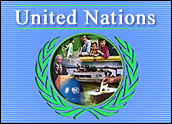
Google and the UN High Commission for Refugees — the United Nations agency responsible for tracking and caring for refugees from the world’s conflicts — unveiled a Web-based mapping tool Tuesday meant to help raise awareness of displaced populations.
The tool, Google Earth Outreach, will help to highlight efforts to help millions of people forced to flee their homes because of war and other conflicts.
Using Google Earth and Maps, the agencies can create multimedia presentations by layering text, audio and video over maps showing where refugee hotspots are located.
“By showing our work in its geographical context, we can really highlight the challenges we face on the ground and how we tackle them,” said Deputy High Commissioner for Refugees L. Craig Johnstone.
The tool launches with a focus on three major areas of displacement: Chad and Darfur in Africa, Iraq and Colombia. More map layers depicting other refugee crises around the world will be added during the rest of 2008, Johnstone noted.
Three Layers
Each layer has three levels of detail, starting with a map-based overview of the commission’s work and the larger regional impact of the displacement on neighboring countries such as the Sudan, Syria and Ecuador.
The second layer focuses on specific issues surrounding the refugee camps, such as health, education, water and sanitation. Users can navigate to specific points in refugee camps and explore text, photographic and video explanations of the specific needs of the refugee operations.
The third level offers a similar view to Google’s Street View mapping tool, enabling users to see specific points of interest such as schools, water points and other infrastructure.
As part of the partnership, Google is donating licenses for the professional versions of Google Earth and SketchUp, a 3-D modeling tool.
A Sophisticated Level of Information
“Charities and nongovernmental organizations (NGOs) are constantly looking for new ways to make people aware of the issues they are trying to solve,” said Rebecca Moore, head of Earth Outreach at Google.
The agency said 350 million people have already downloaded the Google Earth tool, giving it a large audience for its message.
The new tools for telling the stories of the world’s nearly 33 million refugees could help the fund-raising efforts of the many NGOs that support the UN’s work with privately raised capital.
The use of Google Earth for such humanitarian endeavors stands in contrast to some of the controversy that the tools have raised in the past, noted Endpoint Technologies Associates Principal Analyst Roger Kay.
The same thing that makes the tool controversial — the high-resolution images and ability to zoom in to close views — will make it valuable for such causes, he told TechNewsWorld.
“There is an incredibly sophisticated level of information available to the general public,” Kay said. Last month, Google sparked controversy with its images of a U.S. military base. “It has the potential to be a powerful educational tool.”
Telling Stories
The new application emphasizes the value of Google Earth and Maps as platforms on which many different services can be served. Earlier in the week, Google Earth announced a partnership with The New York Times to enable users to view news stories based on their geographical location.
Earlier, the search giant made it possible for YouTube videos to be sorted on Earth and Maps. Google has said that mapping is one way that it can help to organize the world’s information, long its stated mission.
Google was a relative latecomer to the maps and satellite imaging space, but has quickly developed a robust set of tools and services in the area and in doing so has run headlong into controversies over the privacy implications of them, noted Forrester Research analyst Josh Bernoff.
“These types of uses emphasize the upside of having this kind of information widely available,” he told TechNewsWorld. Google, he added, has moved methodically in aiding causes as it grows in power and importance over the daily lives of Web users around the world, supporting causes such as climate change management. “This is a case of information organized and presented in a slightly different way possibly having more of an impact on people — and that could be powerful.”




















































